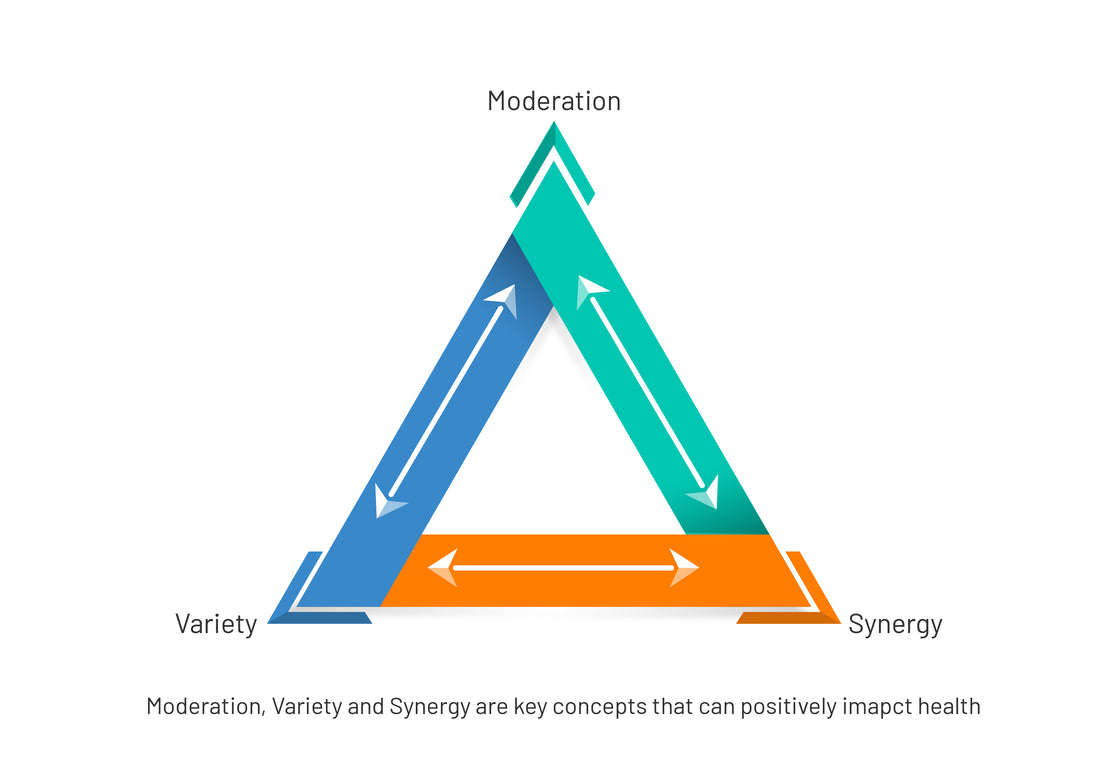Moderation, Variety, and Synergy
Bulletpoint:
- Moderation, Variety and Synergy are three key concepts of health
- Let nature do most of the work for you

In my years of research on how to sustain optimal health and live an anti-cancer lifestyle, Moderation, Variety and Synergy are themes that have proven over and over to be key in the fight against cancer and to support long-term, sustainable lifestyle choices. It “MoVeS” you to health!
Moderation
We’ve all heard that having too much of a good thing can be bad. For those who decide they want to take control of their health, moderation is often skipped, or ignored, or even leaped right over! But the same enthusiasm that causes this rush to health, can cause us to focus excessively on known healthy practices or foods.
For example, discovering that compounds in soy products can help fight cancer does not mean drinking a gallon of soymilk and eating large helpings of soybeans every day is a good idea! Food compounds that are beneficial are often toxic when overconsumed.
In addition, because most foods do not contain the full spectrum of food compounds needed for good health (e.g., vitamins, co-factors), when we consume too much of a “good thing”, there is no room left for other foods (variety), and our bodies can be deprived of important nutrients that are missing from the foods we overconsume.
The same logic applies for products we use. If we use the same product day after day for 20 years, then the chemicals in that product can build up and cause harm. So, even healthy practices have downsides unless they are coupled with moderation.
Our bodies are built to handle acute exposures to toxins or processed food. Therefore, I recommend eating well and limiting toxin exposure for the majority of time, while still allowing that piece of birthday cake or drink once in a while. Just keep in mind that chronic exposure causes harm.
But practicing moderation has another benefit – when not consuming too much of a few things, we leave room for variety.
Variety
Variety is another key piece of in our nutritional armor against cancer. Food really can be medicine, and different kinds and colors of food contain different “medicines”. Eating a variety of food allows the body to receive all of the healthy nutritional benefits we need to be live in an anti-cancer state and support our immune function.
In addition, variety reduces the risk of chronic exposure to toxic substances like unknown pesticides on produce. A variety in the foods we eat also helps prevent chronic exposure to one or a small number of “good” substances that are detrimental when overconsumed. Eating a variety of foods can also unexpected benefits that you cannot achieve with a limited diet, which leads to the last item - synergy.
Synergy
Synergy simply means the combined effects of two or more things (health choices or habits, in this case) are greater than expected. It’s somewhat like 3+3+3=9 versus 3x3x3=27. So, as you might imagine, synergy really matters, and it can offer huge benefit in cellular health. However, synergy works both ways – for the better, to maximize your health and for the worse to maximize disease and disease risk.
Changing just one lifestyle choice or habit is good. Perhaps even great, depending on the habit. But changing two or three or five or more bad habits to good habits offers synergy. It’s a benefit for free!
Moderation and variety act together in synergy. Whole foods provide synergy in nutrient level and absorption that vitamin supplements usually cannot provide. Be careful of reductionism, or the thought that complex systems, like your biology, can be reduced to one, two or a few simple elements.
For example, T. Colin Campbell, author of The China Study, noted in his book “Whole” that in a “study that compared vitamin C supplements to an apple, just two apple slices were found to have the antioxidant strength of three vitamin C supplements, or 1,500 milligrams of the vitamin. However, upon analysis, the apple was shown to contain less than six milligrams of vitamin C”.
This is because of the synergy that exists among the compounds in the apple including vitamin C, and taking vitamin C alone deprives your body of those other compounds that work hand-in-hand with vitamin C to offer that kind of antioxidant power.
Bioavailability is also an important concept to keep in mind. “Bioavailability” is a word that describes the proportion of a substance that will be absorbed by the body. Considering the example above, your body may not absorb the entire 1500mg of vitamin C – it will use what it needs and either excrete or store the rest. Your body is happier just eating the apple.
Therefore, getting your nutrients from food is a complex problem that, conveniently, is already solved by mother nature.
It is useful to note that the nutrients in the foods can vary depending on the quality of the soil in which they were grown, the season they were grown and even the amount and quality of sunlight received. Two seemingly identical looking peaches can vary by as much as 40 times in beta-carotene content due to these factors!
This all means that nutrients affect each other, big time. Magnesium influences the effects of iron, protein affects zinc, vitamin A acts differently when paired with vitamin D, and so on. There are tens of thousands of such nutritional relationships, and that’s a conservative number.
So, using what nature provides as the foundation for better health is the smartest way to start. Thoughtful, targeted supplementation is useful as well, but the key is the words are “thoughtful” and “targeted”. Random, disjointed supplementation is unlikely to offer tangible results you desire, and can even do harm if abused.
So, moderation, variety and synergy are three guiding principles that offer you a clear path to your optimal health.

